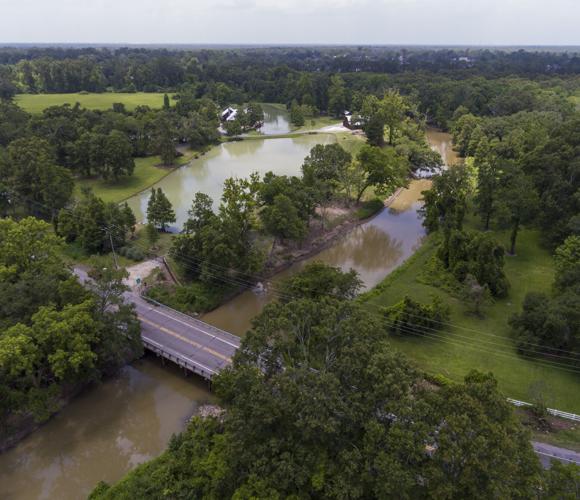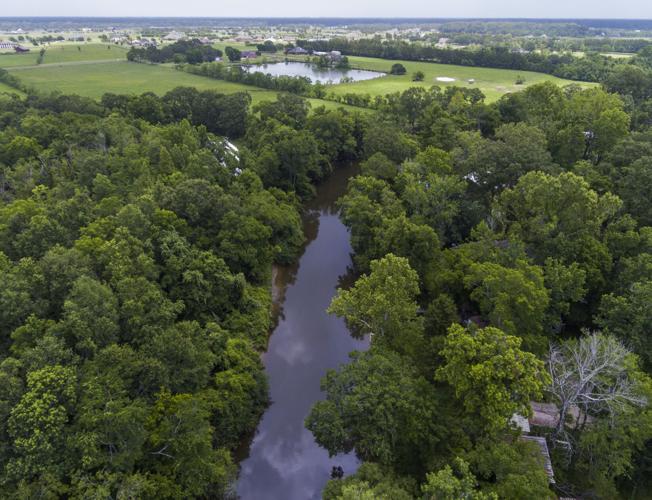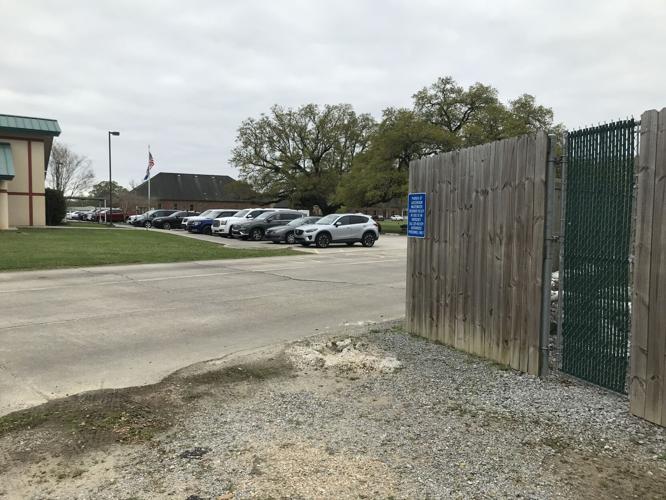Nearly three years after voters agreed to sell Ascension Parish government's sewer systems to a local company, the $9.3 million deal has officially closed.
Parish officials say the arrangement will improve water quality in Bayou Manchac and save local tax dollars currently being spent on the inefficient parish-owned system. However, the deal also means that around 3,000 residential customers will see a 15.5% increase in monthly rates, while some commercial customers could see even higher increases.
And more increases are expected in the years following, according to regulatory papers.
Voters backed the deal overwhelmingly in April 2021, followed by a Parish Council vote months later. But the agreement then went through an extended review by the Louisiana Public Service Commission, which didn't give its final blessing until last fall.
National Water Infrastructure is buying the parish systems as part of a larger plan to build a long-sought, nearly $200 million regional sewage treatment plant to consolidate waste from neighborhood-based sewer plants and send the treated wastewater to the Mississippi River. The shift would pull the wastewater out of Bayou Manchac and other smaller waterways and ditches.
"We're really excited about this whole thing," Tom Pertuit, CEO of National Water Infrastructure, said Monday. "It's been a long, long, long road, and it's been full of ups and downs and hills and valleys and all those things, and it's really wonderful for it come to this point and actually being a realized ... a realized project."
Parish President Clint Cointment told the Parish Council on Thursday night the deal had been signed and a nearly $9.3 million payment that NWI owed the parish for the sewer assets had been wired to parish accounts.
"Ensuring clean water has been a top priority for this administration," Cointment said in a statement Friday. "Today's milestone brings us closer to achieving cleaner waterways, healthier ditches, and improved canals. It underscores our longstanding commitment to this vital goal. This is a huge first step."
Under the agreement, NWI will build and operate the new regional plant in Ascension's industrial area near the river and consolidate more than 75 collection systems and permanently remove 70 treatment plants from the parish's environmentally strained waterways.
When the first phase of the regional plant is built and connected to future regional trunk lines along La. 42 and La. 73, more than 3.5 million gallons per day of sewer discharge will be removed from local ditches and waterways in northern and central parts of Ascension.
NWI is conducting hydraulic studies for major sewer delivery lines and other infrastructure to connect the collection networks and then has plans to finalize the overall design. Pertuit said he expected construction to start by first or second quarter of 2025.
Even before the Ascension sewer purchase, NWI billed itself as the largest private sewer utility in the state. That company is result of Bernhard Capital Partners' acquisition of Ascension Wastewater Treatment in 2020.
Jim Bernhard, the former chief executive officer of Shaw Group and a figure in Democratic politics, is one of Bernhard Capital Partner's founders. The $3.6 billion private equity firm has been focused on amassing infrastructure, engineering and related services companies.
Sewer bills going up
The first round of rate increases pays for NWI's purchase of the parish assets, the operations of the collected systems and other costs, plus an authorized profit.
Parish residential customers' rates are expected to rise from $42.50 to $49.10 per month, matching the rates roughly 17,000 preexisting NWI customers already began paying after the PSC approval last year. NWI residential customers had been paying $45 per month.
Minimum commercial rates will rise from $55 per month to $59.10, but NWI has also been authorized to get more in monthly fees from companies with wastewater that is more intensive to treat.
Parish officials have said the new arrangement could save the Ascension government more than $4.1 million annually and as much as $73.2 million over the next 30 years.
The future regional plant would also be built at no cost to parish government. NWI customers will have to pay instead, including those who live outside Ascension in East Baton Rouge, Livingston and Iberville parishes and will be outside the reach of the future plant.
Estimates that NWI has provided the Public Service Commission indicate rates for the new plant could top out at $87.64 per month for residential customers at the end of a planned five-year buildout of the regional system.
A final post-construction rate adjustment is expected to bring that rate down to about $84 per month.
Minimum commercial rates would also rise. In addition to rate increases, NWI must charge a 4.5% franchise fee and pay it to the parish government for a 20-year, nonexclusive right to parish right of ways.
A PSC consultant told regulators he believed NWI's long-term rate estimates were low partly because of inflation and because he doubted the company's customer growth estimates. Having more customers spreads out the cost of plant construction.
The consultant estimated rates could eventually surpass $100 per month, but the company's officials and their experts countered their aggressive pursuit of new customers and the possibility of low-interest federal financing for construction would help keep rates in line.
Pertuit said his company expects to have 30,000 customers over the next decade and has been making progress with the U.S. Environmental Protection Agency officials who run a program offering low-interest loans for regionally significant water and wastewater projects.
"They want to make this happen," he said.
Company officials also pointed out that, without a more efficient regional plant, tighter state regulation of sewer discharges would require one-by-one upgrades of scattered neighborhood plants and would be far costlier for NWI and its ratepayers.
The commission took the uncommon step of allowing NWI to begin collecting the future additional rate increases for the proposed plant while it is under construction.
Usually, rate increases come after the infrastructure is built and operating, but NWI wanted to avoid big, one-time increases on its customers and told regulators it needed the early revenue to help finance such a large infrastructure project. The additional rate increases are capped at $10 per year.
NWI will have to seek additional PSC approval for each annual increase. Once the plant is finished it can seek an adjustment for any unrecouped costs due to the cap. NWI, however, is projecting a slight decrease in rates for the final adjustment.
While some uncertainty remains, Pertuit said, the final $84 figure his company provided the PSC in 2023 remains accurate. He said the company can't start seeking the additional increases until infrastructure is in the ground, likely in 2026.
The company has also promised the PSC to pursue state programs to help low-income residents afford the future rate increases and also set aside $3.5 million of its own money for that purpose.



